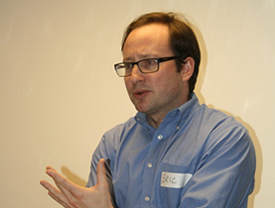| 50% of you think that the South African Government has the potential to make the biggest impact on reducing carbon emissions in South Africa; | |
| 8% opted for the technology sector; and | |
| 42% opted for private industry. |
Shuttle Discovery landed for the last time at Florida’s Kennedy Space Centre on 9 March 2011. Discovery has completed 39 space voyages (its first being on 30 August 1984), has spent a total of 365 days in space and travelled more than 238 million kilometres during it’s lifetime.

 |
Eric Hand at the space science media workshop. |
Twenty South African journalists honed their skills in writing about space science when they attended a workshop in Johannesburg in January. Eric Hand, a science reporter for the journal Nature led the workshop, which focused on recent developments in space sciences in South Africa as well as the challenges and opportunities of reporting on these topics.
Hand is a specialist reporter who covers physics and astronomy topics for Nature and is currently doing a Knight Science Journalism fellowship at MIT. He visited South Africa to report on the Square Kilometre Array (SKA) South Africa project, and SAASTA together with Southern Science and SKA South Africa jumped at the opportunity to arrange a workshop for practicing journalists.
Dr Bernie Fanaroff, Director of SKA South Africa, set the space science scene and provided an update on SKA, an ambitious international science project which aims to build the most powerful radio telescope ever. Fanaroff emphasised the importance of working effectively with the media to ensure public awareness of and support for the construction of the SKA, as well as the country’s bid to host this cutting edge telescope in South Africa.
Raoul Hodges of the CSIR Satellite Applications Centre gave a brief overview of the newly formed South African National Space Agency.
Barriers to science reporting
Journalists identified time pressures and difficult access to top experts as some of the key barriers in reporting effectively on science. According to them, the internal media policies in some local organisations and government departments make it very difficult for journalists to speak directly to leading scientists. Journalists also complained that scientists take very long (sometimes even several months) to grant interviews and respond to enquiries and questions. Hand encouraged them to persevere with “passion” and to try to develop a relationship of mutual trust and respect with scientists, especially those who they regard as key sources of stories.
Hand gave advice on the best sources of science stories, e.g. regular visits to research organisations and science departments at universities, studying their notice boards, and attending scientific conferences.
The media confirmed their interest in reporting on science in general, and space-related stories in particular, but emphasised the need (especially on the part of editors) to be able to show relevance to the lives of ordinary people in their stories. The journalists agreed that it is important to prepare pitches for science stories that can answer the “So what?” question, in order to increase the changes that the story will be commissioned and/or published.
Delegates agreed that it is not the role of science journalists to be “cheerleaders” for science. Even when reporting on a major project such as the SKA, or on a new government initiative such as the new space agency, they have to remain objective and critical. When a project or research is truly new, different, interesting and/or relevant, and if it has the potential to improve people’s lives, the media will report it as such.
Scientists need to learn how the media works and how to package their research for the mass media, including highlighting news angles, relevance and impact, combined with visuals and easy access to the experts.
Hand helped participants analyse the story angles that emerged from the update on the SKA South Africa project, provided by Fanaroff. The workshop resulted in immediate coverage of the project on News24 and Engineering News online. The delegates all asked for more regular updates on the project and confirmed their interest in receiving science news and story ideas as often as possible.
